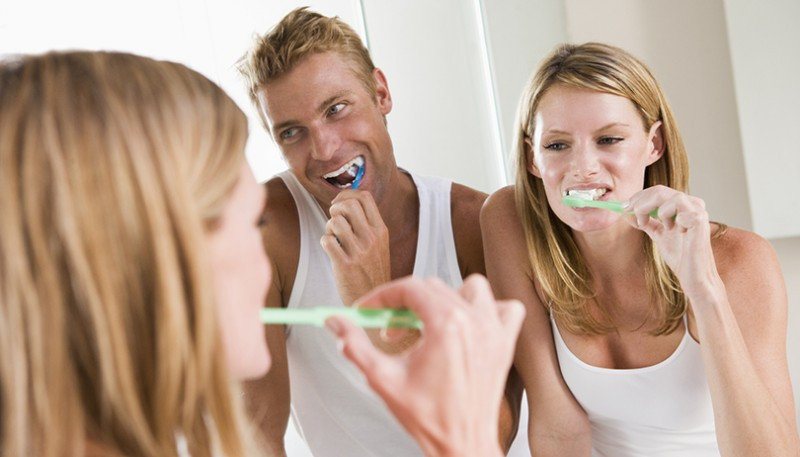October was National Dental Hygiene Month, but if you've been in the habit of having your teeth checked and cleaned twice a year (as recommended), you should know by now that dental hygiene is an every-month proposition. Keeping your teeth healthy involves a lifetime of care, and it involves more than just brushing your teeth once a day (if even that). As an adult, you should be well-versed in the habits of good oral and dental hygiene. That includes frequent flossing, if for no other reason than to set a proper example for your children. They are watching. This is part of modeling healthy behavior. As familydoctor.org puts it, healthy teeth are as important to your children's overall health as it is to yours. Consistent good practices of dental hygiene help your children eat and talk properly. Keeping your teeth thoroughly cleaned and cared for can be an important guard against infection, disease, and other teeth problems – as well as other health issues that can spread into other parts of your body, such as issues involving plaque that originate in your mouth.
Don't Take Healthy Teeth for Granted
It's easy to assume not only that all our teeth will always be there for us, intact within our mouths and firmly embedded in our gums, but also that they will remain strong and functional. But none of those things are a given as we age, as health.usnews.com, points out: Issues such as dry mouth due to medications, sensitivity to temperatures and textures, and painful gums are all common dental complaints. There is nothing complicated about taking care of your teeth – it's mostly a matter of learning (at an early age, presumably) and then practicing certain oral-hygiene habits on a daily basis. Brushing thoroughly after every meal (and snack) as well as once before bedtime for good measure, flossing your teeth and gums, swishing your mouth with antiseptic mouthwash/rinse, avoiding sugary foods and candies, etc. As mayoclinic.org points out, you should consistently keep the area where your teeth meet your gums clean so as to avoid gum disease. Along with that, maintaining cleanliness with the surfaces of your teeth can fend off cavities and gum disease.Good Dental Hygiene Practices
Following are the most important basics of proper oral health and dental hygiene. Make it a point to not only see your dentist every six months – ditto for your children – but to ask your dentist questions and listen carefully to their suggestions for keeping your teeth clean and healthy, and faithfully do what they tell you to do:- Brush your teeth twice a day. Three times (after each meal) is even better. This should take about two minutes as you work you way from one side to the other, top to bottom, doing small circular movements with your brush all along the way and with bristles at a slight angle aimed at the area where each tooth meets the gums. Don't forget to also clean your tongue, per mayoclinic.org.
- Use the proper equipment and toothpaste. Your toothpaste should contain fluoride, and your toothbrush should fit your mouth comfortably and it should have soft bristles. An electrically charged or battery-powered toothbrush can do an even better job of ridding your mouth of plaque that if left behind can lead to a gum disease such as gingivitis.
- Keep things clean. Rinse your toothbrush with water when done and then stow it in an upright position (such as in a cup) so it can air dry before its next use.
- Replace your toothbrush regularly. Figure on every three months or so, per Mayo Clinic, watching for when the bristles become frayed. Ditto the head for your powered toothbrush, if that is what you are using.
- Floss daily. More than once is even better, and this is not just to remove little pieces of food stuck between your teeth, such as broccoli, per healthline.com. It goes deeper than that. The idea ultimately is to reduce plaque, stimulate the gums, and reduce inflammation in that area. If your gums bleed when you brush or floss, it usually means you aren't brushing and flossing as much as you should and/or doing it incorrectly.
- Drink more water. This helps wash out sticky and acidic substances that can sneak by toothbrushes and flossing string.
- See your dentist every six months (twice a year). Didn't we say that already? Do it.
- Teach your children proper dental hygiene habits. Don't make it drudgery – make it fun. Some tips in that regard, per familydoctor.org: let them choose their own toothbrush; let them pick their favorite flavor of toothpaste; watch videos about dental hygiene together; and plan a fun activity following your child's visit to the dentist – one that doesn't include gorging on sweets, right? Right.

